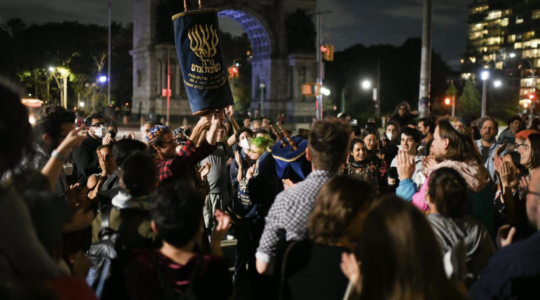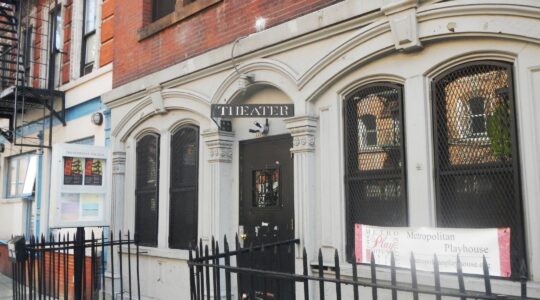The chuppah was covered with white floral garlands, there were at least two rabbis in the room and the gussied-up guests were sipping cocktails and guzzling craft beers. This wasn’t a pop-up Jewish wedding service (though one couple present almost did get married). It was a fundraising dinner for Base Hillel, the innovative Jewish community building project that recently marked its third year of operations.
The reimagining of a classic Jewish ritual, the wedding ceremony under the chuppah and the seven blessings, was the theme of the evening and the perfect metaphor for the Jewish experience Base educators present to their post-college young adult audience.
“Base is really an educational model,” said Rabbi Avram Mlotek, who co-founded the project. “It uses the home as a learning center, so we always try to engage in ritual in creative ways.”
“We have a serious vision for Jewish life. But we also have a very playful nature.”
At a time when Jewish millennials have proven harder for long-standing communal institutions to reach, Base is doing just that and it’s growing. It is finding Jewish young adults in the neighborhoods where they live and engaging them in activities and values they support, like cooking for the homeless and taking a trip to a Jewish art show.
Over the past three years, Base has expanded rapidly, with the Base network that extends from Los Angeles to Berlin, including locations in between in Chicago and Miami. The network already reaches more than 4,000 young Jews, officials say.
An Ithaca, N.Y., location, serving the student community at Cornell University, and another in downtown Chicago are set to open in 2018. Base’s original locations in Williamsburg, Brooklyn, and Downtown Manhattan will be relocating to Crown Heights and the Upper West Side, respectively, and there are plans to open a Harlem location over the next few years.
Faith Brigham Leener says that the plan is to open two new locations every year, with plans forming for Base Hillels in Philadelphia, Boston, San Francisco and other cities.
“We are increasingly seeing a diminishing of the center of American Judaism,” said Brigham Leener. “I think Base is trying to rebuild that center of people who are committed to Judaism, to Jewish people and not through institutions but through the actualization of a set of values.”
“Base is trying to rebuild that center of people who are committed to Judaism, to Jewish people and not through institutions but through the actualization of a set of values.”
Each Base is funded with local support from a mix of federations, foundations and private donors. This year’s inaugural dinner, which took in $70,000, honored the Nagin family for committing to the Guardianship sponsorship level, donating $50,000 per year over three years to contribute to operating costs of a local Base.
“I truly believe that Base is forming a great new sect of Judaism, where community is the keystone and your observance is your own,” said Ally Pockrass, an active participant in Base Downtown.
In a nod to the Jewish camping and youth group experiences of many in the room, the evening began with paper plate awards for the most involved Basers, as they’re called, and speeches about the novelty of the Jewish experience at Base. The program then moved to the chuppah, with seven blessings offered to the Base community by seven groups of people who have been involved over the past few years. The evening ended with raucous dancing and carrying honorees, rabbis and leaders around the room on chairs.
“We have a serious vision for Jewish life,” said Faith Brigham Leener, a co-founder of Base and its national director. “But we also have a very playful nature.”
Support the New York Jewish Week
Our nonprofit newsroom depends on readers like you. Make a donation now to support independent Jewish journalism in New York.




